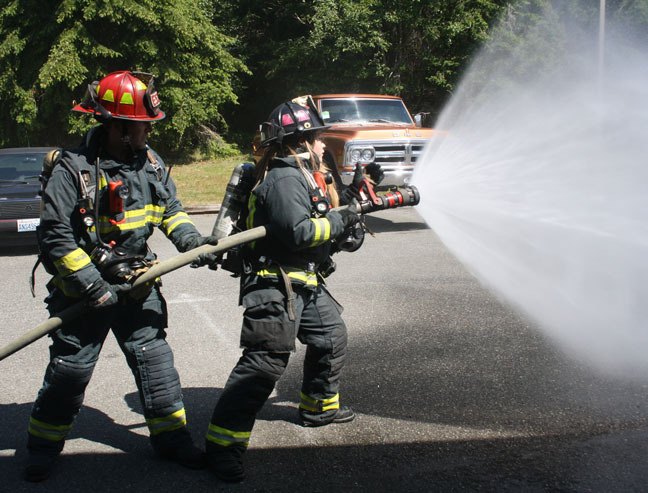When Holly Slothower wanted to find a way to better her future and gain some life skills, she found a great opportunity with Central Whidbey Island Fire & Rescue.
She was only 17 when she started the classes to become an emergency medical technician, and by the time her training was complete, 18-year-old Slothower was working as a volunteer EMT, and eventually went on to be trained as a firefighter, as well.
“It was probably one of the best decisions I could have done,” she said. “It’s given me a lot of insight that most teenagers don’t get in the early stages.”
“It was awesome.”
Now 20, Slothower is a part-time employee with the department, and intends to use her training and experience to someday pursue a career in law enforcement.
The fire district, which covers about 50 square miles from Mutiny Bay and Highway 525 to Libbey Road and Highway 20, currently employs 12 full-time staff and nine part-time employees.
The department has just 17 volunteers.
“In a perfect world, somewhere between 30 and 40 volunteers would be wonderful,” said Chad Michael, deputy chief of Central Whidbey Fire & Rescue.
Central Whidbey has three fire stations and would ideally have about 10 volunteers for each station, according to Michael.
By comparison, South Whidbey Fire/EMS has about 50 volunteers. Deputy Chief Mike Cotton said the district could use a few more at some stations, but that overall volunteer levels were steady.
“I wouldn’t say we’re struggling for volunteers, but we could always use them,” Cotton said.
According to Central Whidbey Training Captain Jerry Helm, anyone 18 and older living in the district can volunteer.
“Men, women — doesn’t matter,” Helm said.
“Everybody above 18 years old and can drive a vehicle [can] start the process.”
The training process, which is completely paid for by Central Whidbey Fire & Rescue, includes a few months of training, with classes on nights and weekends to fit around work and class schedules a volunteer may have.
Volunteers can become firefighters, EMTs or both, according to Helm, and the training for one takes about three to four months.
Helm said that anyone considering volunteering with the district is more than welcome to call or drop in for more information. He said he would happily talk about what being a volunteer would entail, the training and the work.
“The initial training up front is a little bit of a time commitment, but once that’s over with, you get to be involved with a good group of people, and if you have time and can make it work, it’s a good opportunity to be involved in your community,” said Helm.
Michael said that volunteers have the option of either responding to any emergency calls they choose, or signing up to be on-duty volunteers out of the station itself, when they will then respond to any call that comes in.
Kyle Jacobsen started his firefighter training when he was 20 and still in college. Since graduating, he got a job off-island, but still returns to Whidbey Island for his part-time job with the station.
“It was a great opportunity,” Jacobsen said. “It was a good step. I wanted to see if this is what I wanted to do, and being a volunteer helped form that, and I knew I wanted to serve some way.”
Jacobsen now works in construction in Lynnwood, but wants to eventually make firefighting a career.
“Beyond just being able to help out, it’s a great step to figuring out what you want to do,” he said.
Not all volunteers turn firefighting into a career, though. Most of them remain volunteers and work their day jobs.
“In my mind, the biggest benefit is the fact that, particularly in a small community, is that you get to help out your friends and family and neighbors,” Michael said.
Helm said a benefit for some people is that the training counts towards some college credit.
According to Slothower and Jacobsen, many fire departments can sometimes look down on volunteers as not being on the same level, but they said that it’s the complete opposite at Central Whidbey Fire & Rescue.
“That’s one thing I really love about my department,” said Slothower, “There’s not really a bridge between full time, part time, volunteers. We’re all basically the same.”
“Volunteers show up at every big call, every call that we have,” Jacobsen said. “There’s no way we could run a successful department without volunteers.”
For more information, call Central Whidbey Island Fire & Rescue at 360-678-3602.



